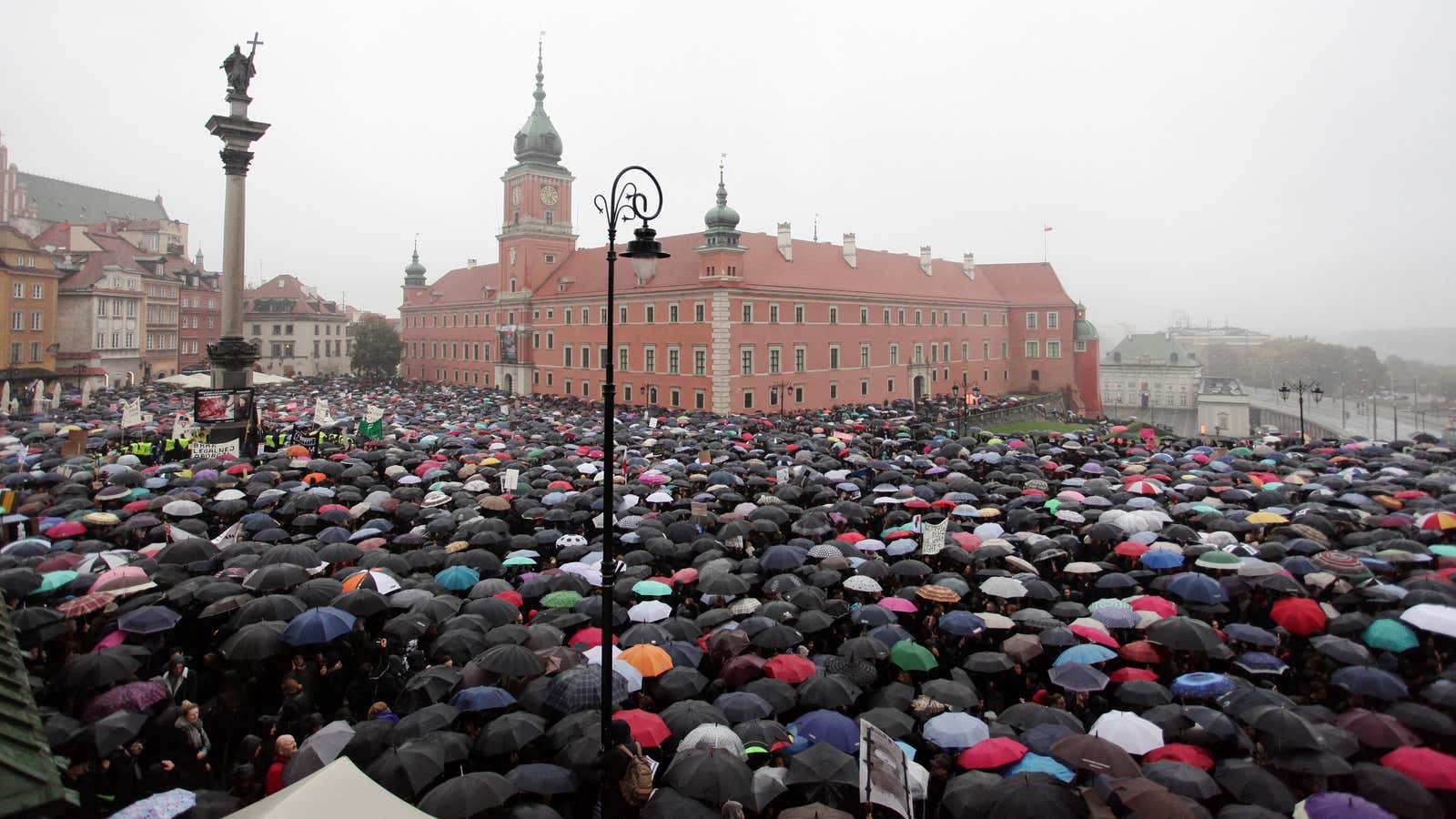For one full day in October 1975, 90% of Icelandic women refused to work—and that included cooking, cleaning, and looking after children—to protest gender discrimination. The protest was a remarkable success, becoming a turning point in how women were viewed in the country. More than four decades later, thousands of Polish women, inspired by the Icelandic “Women’s Day Off,” did not show up for work on Oct. 3 to protest an extremely restrictive anti-abortion law currently under review by the Polish parliament.
The proposed legislation would completely ban abortion, under the threat of criminal prosecution for all parties involved, including the woman who got the procedure and the doctor who carried it out. The law is so onerous that, as some critics have pointed out, it could lead to authorities investigating women who have had miscarriages for being in violation of the law; in early stages of pregnancy, the symptoms of miscarriages are virtually indistinguishable from those of an abortion.
On “Black Monday,” women and men, clad in funereal attire and armed with wire hangers to represent the dangerous alternative to a safe, physician-managed abortion procedure, took to the streets in cities across Poland. More than 20,000 gathered in Warsaw’s rainy Castle Square, under placards with slogans such as “Clerics and politicians, stay away from our uteruses” and “A woman is not an incubator!”
The final count isn’t in, but Polish media estimated that the numbers would be in the thousands. In Czestochowa, a popular destination for Catholic pilgrimages, 60 city officials didn’t show up to work; in the city of Lodz, 100 officials also protested by skipping work (link in Polish). In Wroclaw, several stores in a shopping mall were closed. TV anchors from the privately run national 24-hour news channel TVN24 wore black on air; Gazeta Wyborcza,a leading daily newspaper and the magazine Polityka both declared their support. Social media users said their bike repair shops, accountant offices, pharmacies, and cafes were all on strike.
Black Monday is the culmination of an organized social media initiative that had people wearing black post pictures with the hashtag #czarnyprotest (“black protest”) in past weeks (including the author of this post). Solidarity rallies were organized all around the world over the weekend and on Monday, including in Kenya, Spain, and a massive protest in Berlin. Women from Iceland released a video in support of the Polish effort.
The proposed abortion ban is a citizen-sponsored legislation, signed by 400,000 people and pushed by a group of conservative lawyers, some of whom allegedly have ties to the powerful and secretive Catholic organization Opus Dei, according to Gazeta Wyborcza (link in Polish).
The conservative Law and Justice party, which has majority rule in Poland, voted to accept the proposal, which is now under review by a parliamentary committee.
Poland, an overwhelmingly Catholic country (more than 90% of the population), already has one of the strictest abortion laws in Europe: it allows the termination of a pregnancy only in cases of rape (as determined by a court official), or when the life or health of the mother or fetus are in danger (as determined by a two doctors, the second confirming the diagnosis of the first).
Law and Justice also plans to put forth its own proposal (link in Polish) to be reviewed in parliament alongside the citizens’ legislation, which would allow abortion in cases of rape or when the mother’s health is in danger, but would forbid it in cases where just the fetus’s health is at risk. In either case, the abortion ban in Poland would become stricter than it is now.
The abortion ban isn’t the only reproductive rights law currently under debate in Poland. A separate legislation that is under review by the Polish parliament stipulates that in vitro fertilization procedures must use only one embryo at a time, and that the embryo must be implanted in a woman’s body 72 hours after having been fertilized—two requirements that drastically reduce the chances of the procedure’s success.




